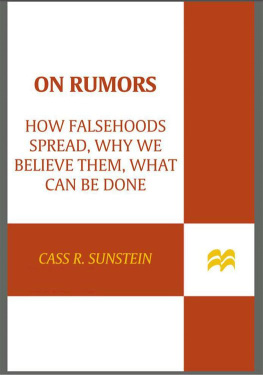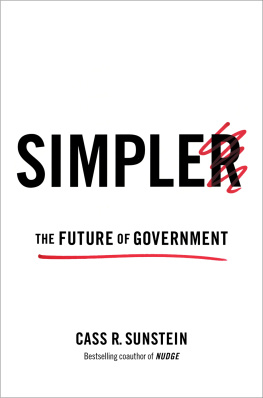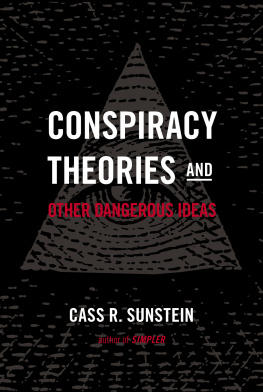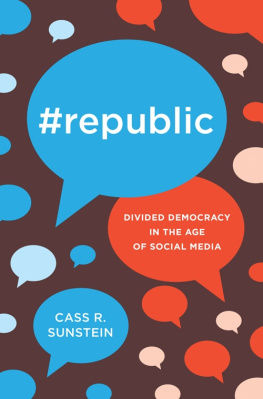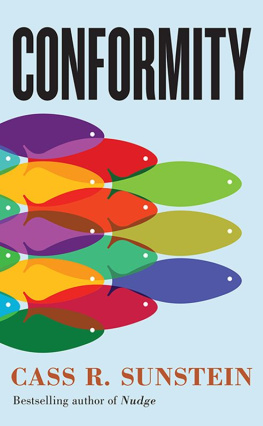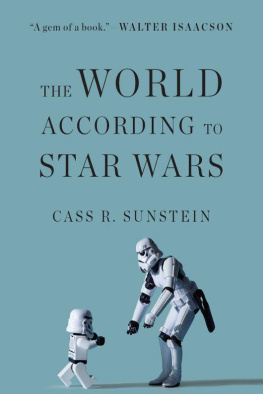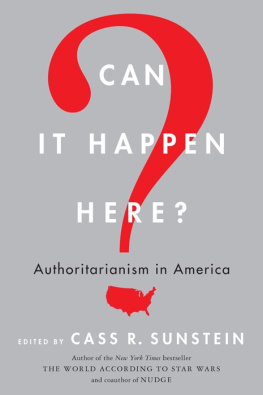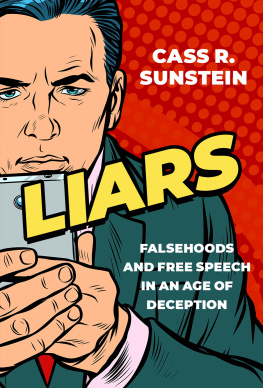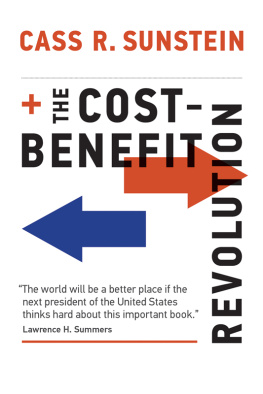On Rumors

How Falsehoods Spread,
Why We Believe Them,
What Can Be Done

Cass R. Sunstein
Farrar, Straus and Giroux
New York
Farrar, Straus and Giroux
18 West 18th Street, New York 10011
Copyright 2009 by Cass R. Sunstein
All rights reserved
Distributed in Canada by D&M Publishers, Inc.
Printed in the United States of America
First edition, 2009
Library of Congress Cataloging-in-Publication Data
Sunstein, Cass R.
On rumors : how falsehoods spread, why we believe them, what can be done / by Cass R. Sunstein.1st ed.
p. cm.
ISBN-13: 978-0-8090-9473-8 (hardcover: alk. paper)
ISBN-10: 0-8090-9473-8 (hardcover : alk. paper)
1. Rumor. 2. Social psychology. I. Title.
HM1241 .S85 2009
302.24dc22
2009015217
Designed by Jonathan D. Lippincott
www.fsgbooks.com
1 3 5 7 9 10 8 6 4 2
For
Declan
Each rumor has its own public.
Gordon Allport and Leo Postman,
The Psychology of Rumor
On Rumors

The Problem
Rumors are nearly as old as human history, but with the rise of the Internet, they have become ubiquitous. In fact we are now awash in them. False rumors are especially troublesome; they impose real damage on individuals and institutions, and they often resist correction. They can threaten careers, policies, public officials, and sometimes even democracy itself.
Many of the most pervasive rumors involve famous people in politics and entertainment. Others involve companies, large and small. Still others involve people who are not at all in the public eye. All of us are potential victims of rumors, including false and vicious ones.
In the 2008 election, many Americans believed that Barack Obama was a Muslim, that he was not born in the United States, and that he pals around with terrorists. Rumors are pervasive about the allegedly terrible acts, beliefs, and motivations of public officials and about the allegedly scandalous private lives not only of those officials, but also of many other people with a high public profile. Rumors can harm the economy as well. If it is rumored on that a company is about to fail, stockholders might well be frightened, and they might sell. Because of the rumor, the company might be seriously harmed. Rumors can and do affect the stock market itself, even if they are baseless. It should not be entirely surprising that the Securities and Exchange Commission has taken a keen interest in the pernicious effects of false rumors, and that New York has made it a crime to circulate false rumors about the financial status of banks.
In the era of the Internet, it has become easy to spread false or misleading rumors about almost anyone. A high school student, a salesperson, a professor, a banker, an employer, an insurance broker, a real estate agenteach of these is vulnerable to an allegation that can have a painful, damaging, or even devastating effect. If an allegation of misconduct appears on the Internet, those who Google the relevant name will immediately learn about it. The allegation will help to define the person. (It might even end up on Wikipedia, at least for a time.) The rumor can involve organizations as well as individualsthe Central Intelligence Agency, General Motors, Bank of America, the Boy Scouts, the Catholic Church. Material on the Internet has considerable longevity. For all practical purposes, it may even be permanent. For this reason, a false rumor can have an enduring effect.
This small book has two goals. The first is to answer these questions: Why do ordinary human beings accept rumors, even false, destructive, and bizarre ones? Why do some groups, and even nations, accept rumors that other groups and nations deem preposterous? The second is to answer this question: What can we do to protect ourselves against the harmful effects of false rumors? As we shall see, part of the answer lies in recognizing that a chilling effect on those who would spread destructive falsehoods can be an excellent idea.
We will also see that when people believe rumors, the believers are often perfectly rational, in the sense that their belief is quite sensible in light of their existing knowledge. We lack direct or personal knowledge about the facts that underlie most of our judgments. How do you know that the Earth isnt flat? That Shakespeare really existed? That matter is made of atoms? That the Holocaust actually occurred? That Lee Harvey Oswald assassinated President Kennedy? Most of our knowledge is at best indirect about other people, other nations, other cultures, other religions. We rarely know for sure whether a particular company is in terrible trouble, or whether a particular public official has taken a bribe, or whether an influential person has a terrible secret agenda or a shameful incident in her past. Lacking personal knowledge, we tend to think that where there is smoke, there is fireor that a rumor would not have spread unless it was at least partly true. Perhaps the truth is even worse than the rumor. Certainly we should be cautious before entrusting our nation or our company to the hands of someone who is rumored to have said or done bad things. Our willingness to think in this way causes special problems when we rely on the Internet for our information, simply because false rumors are so pervasive there.
There is no settled definition of rumors, and I will not attempt to offer one here. To get the discussion off the ground, let us acknowledge the crudeness of any definition, put semantic debates to one side, and take the term to refer roughly to claims of factabout people, groups, events, and institutionsthat have not been shown to be true, but that move from one person to another, and hence have credibility not because direct evidence is known to support them, but because other people seem to believe them. So understood, rumors often arise and gain traction because they fit with, and support, the prior convictions of those who accept them. Some people and some groups are predisposed to accept certain rumors, because those rumors are compatible with their self-interest, or with what they think they know to be true. In 2008, many Americans were prepared to believe that Governor Sarah Palin thought that Africa was a country rather than a continent, because that ridiculous confusion fit with what they already thought about Governor Palin. Other people were predisposed to reject the same rumor as probably baseless. Exposure to the same information spurred radically different beliefs.

